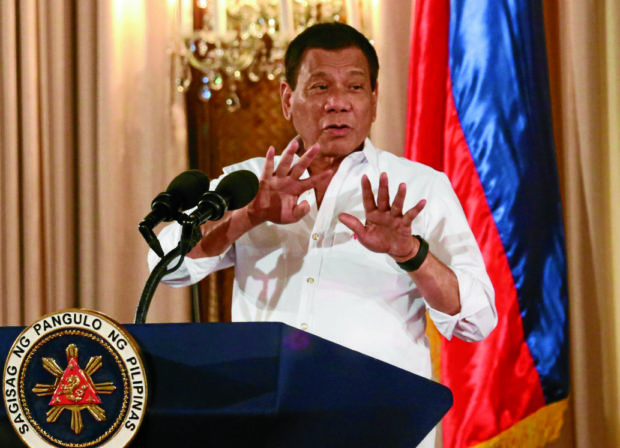Duterte’s first year in office marked by ‘human rights calamity’—HRW

President Rodrigo Duterte. JOAN BONDOC/INQUIRER FILE PHOTO
President Rodrigo Duterte has unleashed a “human rights calamity” in the Philippines in his first year in office, a New York-based human rights group said on Wednesday as it called for a UN-led probe to stop the killings in the country and hold the President accountable.
Human Rights Watch (HRW) said the government’s “murderous” war on drugs, drug-related overcrowding of jails, and alleged harassment and prosecution of drug war critics had caused a “steep decline in respect for basic rights” since Duterte’s assumption in office.
“President Duterte took office promising to protect human rights, but has instead spent his first year in office as a boisterous instigator for an unlawful killing campaign,” said Phelim Kine, deputy Asia director of HRW, said in a statement.
“Duterte has supported and incited ‘drug war’ killings while retaliating against those fearless enough to challenge his assault on human rights,” Kine added.
Duterte will mark his first year in Malacañang on Friday, June 30.
Article continues after this advertisementREAD: Duterte: One year of bold initiatives, shock and awe
Article continues after this advertisementThe group noted that since Duterte assumed office on July 1, last year, security forces and “unidentified gunmen” had reportedly killed at least 7,000 suspected drug users and dealers, including the 3,116 killings by police based on government’s data.
Yet, the HRC said the Duterte administration had rejected all domestic and international calls for accountability for these abuses, and instead, denied any government responsibility for the thousands of drug war deaths.
“During his first year in office, President Duterte and his government have demonstrated a fundamental unwillingness to respect rights or provide justice for people whose rights have been violated,” Kine said.
“A UN-led international investigation is desperately needed to help stop the slaughter and press for accountability for Duterte’s human rights catastrophe,” he said.
Duterte had already been charge at the International Criminal Court for alleged crimes against humanity.
The group, citing its own research, also branded as “blatant falsehoods,” the government’s claim that the deaths of suspected drug users and dealers were lawful.
READ: Duterte criminally liable for ‘human rights calamity’—HRW report
“Interviews with witnesses and victims’ relatives and analysis of police records expose a pattern of unlawful police conduct designed to paint a veneer of legality over extrajudicial executions that may amount to crimes against humanity,” the HRW said.
“While the Philippine National Police have publicly sought to distinguish between suspects killed while resisting arrest and killings by ‘unknown gunmen’ or ‘vigilantes,’ Human Rights Watch found no such distinction in the cases investigated.”
“In several such cases, the police dismissed allegations of involvement when only hours before the suspects had been in police custody. Such cases call into question government assertions that the majority of killings were carried out by vigilantes or rival drug gangs,” it further said.
The HRW said Duterte’s war on drugs has also “worsened the already dire conditions of Philippine jail facilities, including inadequate food and unsanitary conditions.”
“Government data indicates that the country’s jail facilities run by the Bureau of Jail Management and Penology, which have a maximum capacity of 20,399, currently hold nearly 132,000 detainees, an overwhelming majority of them awaiting trial or sentencing,” it said.
“The bureau attributes the overcrowding to the arrest of tens of thousands of suspected drug users and dealers since the anti-drug campaign began.”
The drug war, the group said, has also boosted the number of “secret jails” in which police had reportedly detained suspects unlawfully, demanding bribes in exchange for their release.
The HRC, likewise, mentioned how the Duterte administration had subjected to harassment, intimidation and even arrest some of its prominent critics like Senator Leila de Lima.
De Lima was arrested and detained last February over her alleged involvement on illegal drugs.
“Other critics of the killings – including activists, journalists, international officials, and ordinary Filipinos – have been threatened online by pro-Duterte supporters and trolls. Among those targeted were Agnes Callamard, the United Nations special rapporteur on extrajudicial executions, and international experts on drug dependency,” the group added. IDL